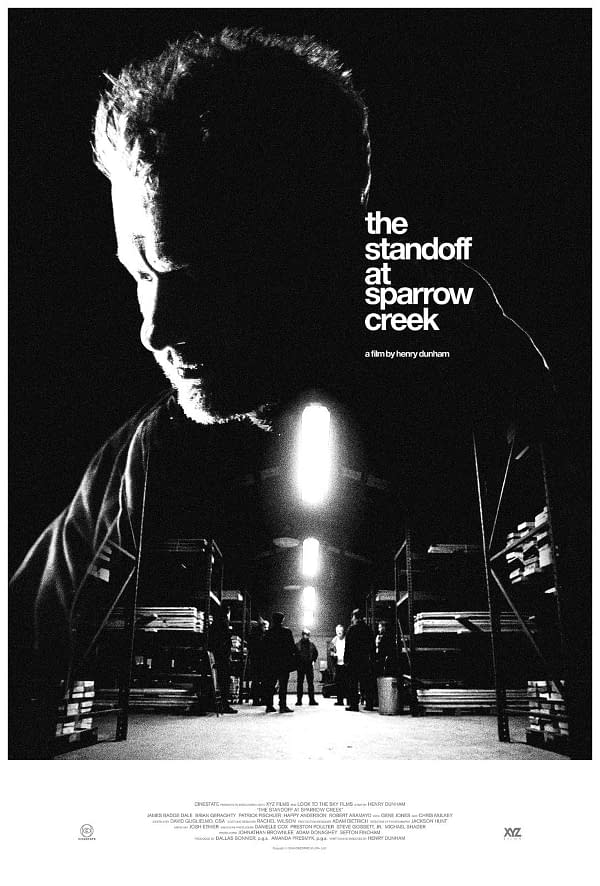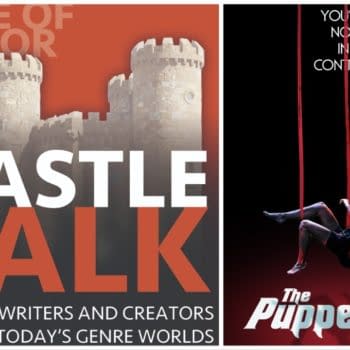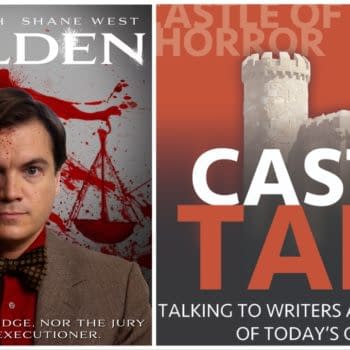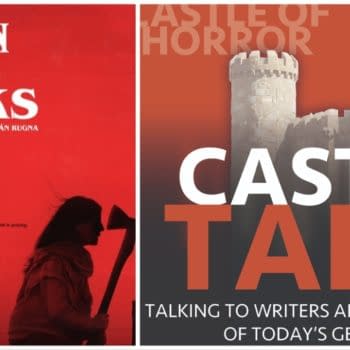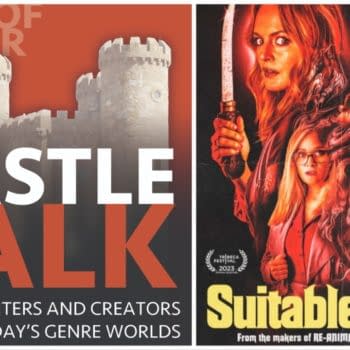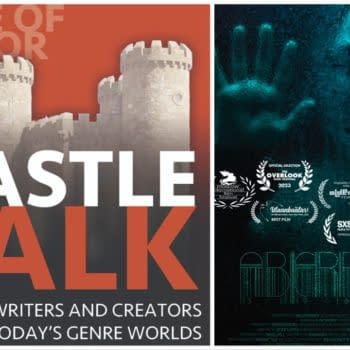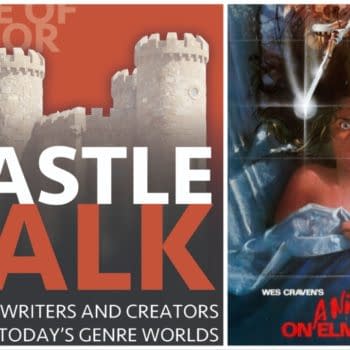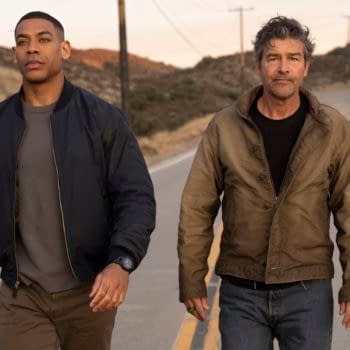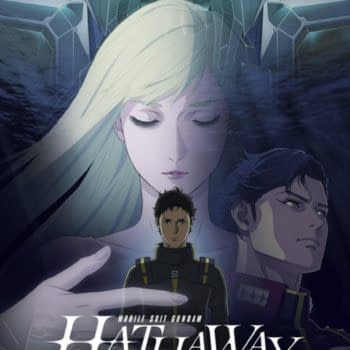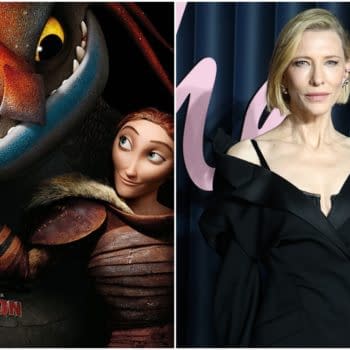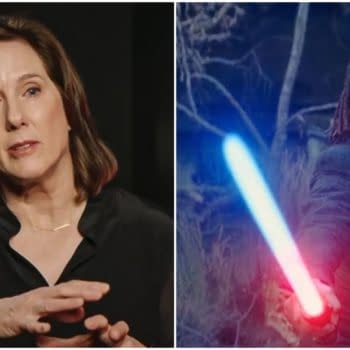Posted in: Interview, Movies, Podcasts | Tagged: Castle of Horror Podcast, Henry Dunham, Standoff at Sparrow Creek
Interview: Henry Dunham's Tense 'Standoff at Sparrow Creek' Takes On Militias, Guns, And Cop-Killing
At Fantastic Fest 2018, Castle of Horror Co-Host Tony Salvaggio was able to sit down with Writer/Director Henry Dunham to discuss his film The Standoff at Sparrow Creek, a taut thriller with a timely conceit. An armed militia realizes that one of their own is a cop-killer, and in the tense hours after the shooting, they try to ferret out the killer. In addition to sharing what it's like to have your work be pulled into focus by current events, Dunham also gives some great recommendations for films to check out that influenced him in the making of his directorial debut.
Check out the Trailer:
Tony: So I'm going to cut straight to the elephant in the room. How long has this been in production and how much has changed since there's definitely been a change in climate in the US [about guns and militias]. Art can take a long time to come into being; has anything that's happened over the past year or so changed anything about the film and your perception of releasing a film in this, in this current climate. There's a lot going on in this film that is relevant, but I found that there is a lot of gray area in the movie that I think is worthy of watching and discussing.
Henry Dunham: Yeah, It's a great question. I wrote the first draft of the script in probably 2011, so it has been a while. The script was done in probably 2013 and then sort of got released and spread around in 2015. How it came to be and how it came to progress with the times was that it was originally called Militia. But as soon as you know, shit hit the fan in the world and everybody just went insane. I changed the title. Because I was like, "I do not want this to be misconstrued as something it's not". You've got to give these characters a chance and to have it be focused more on the story and the circumstances of the night versus just having the audience look at that word and be like, "Fuck you. I'm out!"
That was the first thing. The second thing was story-wise nothing really changed, because it was always going to be about the character in the story of somebody going from a position of trying to be isolated and making it out there alone to, (without giving anything away), being thrust up against the paradox of, okay, do you continue that lifestyle or do you join back up with the group that is probably going to hurt you again, but it's better than being alone.
That story was always the impact. As far as plot machinations and how those things were adjusted, it really just came to a point where it was reinforcing what I had always kind of wanted to do with it to begin with. Which was treat this just like a seventies stage play that just so happens to take place in an unfamiliar story arena.
Let this be an incredibly universal, accessible conflict and an accessible drama that takes place in a very "inaccessible" story arena. Just treating it with the kind of delicacy almost that it needed to be treated with in order to have the audience be able to go, "Okay, I'll go there with you. You're, you're doing this in a subtle and pointful enough way that I'll trust you and I'll go there with you."
Just keeping it about the people and not so focused about ideology or politics because I'm barely politically coherent but at the same time a Democrat. Which is just hilarious. Whenever anybody who's just like "Is this pro Right Wing?" I have to say, "There's one thing I can guarantee you. It's not, it's that."It was just– it was just an adjustment on the fly, saying "This is timely, unfortunately, but it doesn't mean it shouldn't exist."
I kept looking at stuff like Dr. Strangelove and Failsafe, about the nuclear holocaust during the height of the Cuban missile crisis. I'm like, well, we kind of have to go there. Not that this is on the same level, but you have to not be intimidated by the circumstances that we're in right now. You kind of just have to go there.
Tony: Was there anything as you moved along that you felt that you would self-censor or did you ever think "Wow, this isn't necessarily maybe what I want to put out there." Not that you should, but, was that ever a thought?
Henry Dunham: You know, I think there was a moment where I definitely thought about it this. When you're creating anything, you're constantly battling with self-doubt in every single way, but then to have it be kind of reflected in such a timely manner, that it's almost intimidating… Of course! But the thing you keep coming back to is not the plot, not the circumstances, but the story. If the story is important enough to you, then everything else just sort of falls by the wayside. You have to say "Okay, the emotional through line of the protagonist is too important to me. It's something that is near and dear to me."
I kind of just have to look at the rest and say that (even though it's probably an unachievable hope) as much as people say the story is timely, I also kind of hope that it has a little timelessness to it. It's something that we're always going to be struggling with as people. Being a part of something, whether or not it's good for you. I hope that it can survive the times so to speak.
Tony: I'm with you. At the end of the day, you have a locked room mystery as the setup and it's more about are you along for the ride with this particular locked room mystery, that happens to be of this time. At the heart, you have characters dealing with this situation and that can be at any point in time.
Speaking of which, how did you go about finding your cast? They all do a really good job of selling their character.Henry Dunham: Yeah, they are amazing! It was always kind of the casting mission statement; I wanted to pass this like it's a pilot for an HBO series. With great character actors who when you see them, you know they're going to put forth really great work, and that, you trust them. Also, that nobody is such a disproportionate star that it takes you out of it. Like it would just be really odd if like Nic Cage was one of the guys, you wouldn't buy it. Whenever I talked to anybody, the first thing I asked was if they had any theater background because it's basically a play. And luckily all of them did, and they all read it the same way. They were just like, "I haven't done anything like this in a while and it just feels like a play."
That was huge. Then it was just making sure that they all sort of got the emotional through line of that particular character; explaining to them this is what this person is struggling with, this is what this night sort of unleashes in them. And how they arc in this short span of time in such a massive way. This is what they need so badly that this night sort of acts as a catalyst for, for them.
We were spoiled. Every one of them just got their characters so well, and delivered so well that it just made everybody's job a lot easier. Thankfully the producers were supportive of pretty much every casting choice.Tony: What kind of challenges did you face getting all of this together?
Henry Dunham: A lot of it is just the stuff we talked about. Things like I'm a first time feature director and when an actor reads the script, nine times out of 10, the thing we got was "They loved it, but I don't know what this is going to be." Or "It's just not the right thing for me right now" It was having conversations with people like this where you say, "Okay, here's what it is. It's just a story about this emotional through line. I'm just setting it in this arena because it's more interesting and dramatizing this is something you don't see every day. It's just more cinematic and the stakes are higher and it's more immediate."
I think once you get that kind of trust in them where they know, "Okay, this is what you're doing, this is how you're doing this." That was really key. Once I talked to [James] Badge [Dale] for the first time, I was just like talking about seventies French thrillers and about Jean-Pierre Melville he started to say "Oh! Okay, you're going with it in a different way than I expected."
He was right there from the get go on that one. We were talking about Friends of Eddie Coil and all these great kind of understate seventies movies. That was our hopeful but perhaps impossible target to hit. That kind of accelerated everything casting wise.
Tony: I think it's a really tight thriller, but if you had to sell someone on seeing this movie, say if they are on the fence because they think maybe it might not align with their views one way or another, what you say to them? It can be a challenge when there is such a heightened awareness of tough topics like gun violence and militias.
Henry Dunham: I would say it's a modern day seventies thriller set in the rust belt of America. It's a psychological noire about what it means to be a part of something. We don't go to really any violent places in it at all. There's, I mean, there's no blood in it. I think we say fuck three times. It's a social thriller. Granted, that genre has been sort of coined recently. I would say anybody who wants to watch a stage play about some heavy shit, this is it. Not to be trite about it.
Tony: I have to say, I am not always a fan of seeing a movie where I can see that it was a play and it's just filmed that way.
Henry Dunham: Like seeing "God of Carnage" on stage versus seeing "Carnage" with Kate Winslet?
Tony: Something like that, yeah. If I can tell from the pacing and staging that it's adapted, it often takes me out of it. Not all the time, because there are some great adaptations. However, watching your film, I liked that your approach was to go back to it being a play, but it to me it never took me out of it. It worked well for me. It's hard to do but I think you succeeded in what you were going for.
Henry Dunham: Nice, Thank you very much, that's very sweet. I like reading plays. I don't really go to the theater that often, but I love movies. So, you know, this thing was always written like this. Even if I say it's a stage play, but it's a movie. Writing and directing the movies has always been the thing that I said "I'm going to do that or nothing." It's driven by those kinds of cinematic devices. Our camera work and our lighting and everything like that. It's meant to be on the screen. People have said,
"You could do this as a play" and my response is "You could, but the play might suck" because it's meant to be a movie. I don't know how on the stage you'd be able to pull off the lighting schemes, as they matter to the story. I don't know how you do those on the stage.Tony: Agreed. Not to get too cliché, but those things are as much a character as the actors It's important where all of the people are located in any given time, and showing that is extremely important.
Henry Dunham: It absolutely is. How those things progress should be right in line with the story. For example, not to blow anything, but all Morris wants is publicity and spotlight for somebody he loves. When his lie is exposed, as soon as it is and we don't need you anymore, shut the light off and then a doorway slit of light gives him the spotlight and he's alone in that massive space. "You wanted the spotlight, here it is." But I don't know how you do that on a stage.
Tony: So you named a few, would like to give us a few more of your influences for the film?
Henry Dunham: I was obsessed with Melville, Bresson, and Sidney Lumet's Failsafe. I was obsessed with it. It's an overlooked movie but for a good reason-because it came out next to fucking Strangelove. But, it's as if Strangelove was done seriously. And it is the most restrained, beautiful, contained movie. Where you're just like horrified at what's going on because of how subtle everyone is being. And it's just like, "No, this is how it would be. It would be the sterilized." And that contrast is just so powerful. But truly, I was watching Army of Shadows probably once a week, (the Melville movie). That movie is so masterful with how it deals with restraint, and how it deals with taking an incredibly small scenario and making it the most tense thing you've ever seen. Um, so yeah, those seventies French ones are the ones.
***
That is where we ran out of time, but I think we could have gone on talking about 70s thrillers for quite some time afterward. Henry Dunham clearly has a good head for the classics and it shows in his filmmaking. Check out The Standoff at Sparrow Creek in theaters, VOD and Digital HD starting Friday, January 18th.


